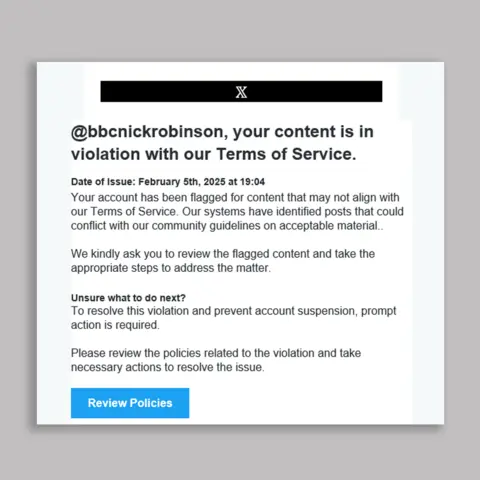Nick Robinson's X account hacked to promote crypto
BBC journalist Nick Robinson says his X account was hacked and used to promote cryptocurrency after he was apparently targeted in an online phishing scam.
The Today programme presenter became locked out of his account on X, previously known as Twitter, on Monday night after he clicked a link in an email he wrongly believed was sent to him by the social media platform.
Robinson, 61, said that he was still locked out of his account on Tuesday after his passwords were changed, "so anything you read today, it won't be me".
A cyber security expert said such attacks were likely to be opportunistic, with code instead of humans seeking out social media users who have a large number of followers, to exploit them.
The email sent to Robinson was designed to look like it was legitimate, and included a link it said would allow him to review content it claimed had violated X's policies to stop his account being suspended.
But the email address which sent the email did not end with "@x.com" or "@e.X.com" addresses used by the platform for official communication.

Following Tuesday's Today programme, Robinson said he had fallen for the scam despite having completed online security courses which highlighted tell-tale signs of phishing emails.
He said: "Why? Because my defences were down - I was tired after a very long day, I was rushing, and the phishing email made me think that if I didn't act fast I'd be in trouble.
"However, I didn't just fall for it. I tried repeatedly to use the official authentic X site to deal with the problem I was being alerted to, and only after trying again and again and failing did I think 'oh sod it, what's the worst that can happen?'
"Well now I know. I should have thought the opposite - i.e. if this alleged problem is really serious they'll be in touch again."
He added: "My main mistake was not to check the email address which made clear it wasn't X that were contacting me but a hacker. Everything else looked just like the real thing."

Robinson told Today listeners the hack came days after he was "swamped by critical messages" from supporters of Elon Musk after he had pointed out a statement made by the billionaire owner of X was untrue.
His Today co-host Amol Rajan had raised the hack, joking that his "very own tech bro, the mighty Nick Robinson, has finally succumbed to the temptations online, and I see overnight, is launching a cryptocurrency".
"This is the big news in Britain, and what listeners want to know, Nick, is how do they invest?," he added.
Robinson said his account had been used to make it look like he was launching a cryptocurrency called '$Today' on the Solana blockchain platform.
"So if you read that, it's complete nonsense, quite entertaining nonsense," Robinson told the programme.
He added: "But there's a lesson learned - don't click on everything you see."
Taking over X accounts to advertise scam crypto coins is a common method used by low-skilled cyber criminals to make a quick buck.
They often spread the net wide by sending out phishing emails to many high profile accounts in order to maximise their chances of getting a bite. At that point they take over the account and plan their posts around hastily spun up crypto coins that can only take a couple of hours to create and launch.
They hope that high profile and trusted accounts might encourage people to buy some of the otherwise worthless coins so that they can make some money before it all get blocked and stopped. In this case it looks like the scammers failed to make much money at all for their efforts.
But Toby Lewis, global head of threat analysis at cyber-security firm Darktrace, said anyone can be targeted and fall victim to similar hacking scams.
"There are signs we can look out for. But the problem with these emails is they are designed to attack us when we are distracted and busy," he said.
"Good advice is don't don't click links in emails. If it's an important message, it will be there on the relevant website for me when I log on to it.
"But with these type of threats, they will always evolve."
X has been approached for comment.
